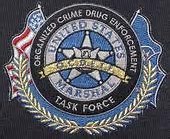BIRMINGHAM — The Organized Crime Drug Enforcement Task Force for the federal Northern District of Alabama earned national recognition for the focused effort it launched in 2012 to stem the flow of heroin into Birmingham by prosecuting some of the largest heroin distributors in the city, on down to street-level dealers, announced U.S. Attorney Joyce White Vance.
OCDETF Regional Director Michael F. Smith today presented a 2014 National OCDETF Award to an interagency Heroin Initiative Group of investigators and prosecutors working with Assistant U.S. Attorneys Gregory R. Dimler and L. James Weil. Dimler leads the OCDETF section in the U.S. Attorney’s Office. The bi-annual awards recognize outstanding investigations from the OCDETF Regions, as well as individuals who best exemplify the mission and spirit of the OCDETF Program, said national Organized Crime Drug Enforcement Task Forces Director Bruce Ohr.
“The initiative launched in 2012 was a major strike at the supply of heroin into Birmingham, which significantly interrupted the flow of the drug into our community and shut down some major suppliers,” Vance said. “Of course, there are always new sources, new traffickers and new street dealers, so the fight continues,” she said. “We have an ongoing commitment to working with federal, state and local law enforcement partners to interdict the heroin supply, while working with our community-based initiative and partners in the medical community to prevent and treat addiction,” she said. “I am grateful we have groups like this, committed to protecting the community.”
During today’s award presentation, Ohr thanked the interagency Heroin Initiative Group for developing a unified approach to address the heroin epidemic threatening the Birmingham area. “Your contributions and achievements have bolstered the OCDETF Program’s efforts to fight heroin and positively impact our communities,” he said.
The OCDETF Program is a partnership between federal, state and local law enforcement agencies. The principal mission of the OCDETF Program is to identify, disrupt, and dismantle the most serious drug–trafficking organizations primarily responsible for the nation’s illegal drug supply.
Participants in the 2012-2013 Heroin Initiative Group that received the award, along with Dimler and Weil, are: Hattie French and Jude Washington, Jefferson County Sheriff’s Office; Gregory S. Gauger and M. Wayne Gerhardt, FBI; Jason Green, Pelham Police Department; M. Ezra Heath, Internal Revenue Service, Criminal Investigation; Scott Holmes, Tuscaloosa County District Attorney’s Office; Alan Miller, Shelby County District Attorney’s Office; John Walker, Birmingham Police Department, and Patrick Wilson and Troy Wilson, Drug Enforcement Administration.
A spike in heroin overdose deaths in the Greater Birmingham Metro Area spurred the group’s formation. The U.S. Attorney called law enforcement together in July 2012 to develop a unified approach to reduce the spread of the deadly drug. Heroin deaths had almost doubled in Jefferson County from 2011 to 2012, climbing from 30 to 58. The number of heroin deaths also soared, from 15 to 82, between 2008 and 2012 in Jefferson, Shelby and Tuscaloosa counties. The rise in heroin deaths leveled off for a year after the law enforcement push, but took off again in 2014, with 137 in Jefferson County alone.
The 2012 initiative saw federal, state and local law enforcement combine to share intelligence and work within the framework of two OCDETF investigations to disrupt the supply of heroin and dismantle the organizations distributing it. While the investigations were under way, the U.S. attorney and law enforcement leaders began a media outreach to educate the community about the growing presence and deadly nature of heroin.
On the supply side, the OCDETF investigation called, “King of the Hill,” focused on the heroin trafficking activities of Billy “Champ” Williams Jr., and his associates. The work dismantled Williams’ organization and included the seizure of two kilograms of nearly pure heroin and a kilogram and a half of cocaine. Williams and 10 members of his organization were convicted of drug trafficking or money laundering and the government seized more than $500,000 in cash, jewelry, furs and luxury vehicles. Williams was sentenced to 22 years in prison.
In a second OCDETF operation, called “Blue Magic,” the DEA, and multiple local and state agencies, simultaneously targeted lower-level heroin dealers and their sources of supply. The office wanted drug dealers and the community to know that federal authorities are serious in tackling the heroin problem at the street level and up the supply chain.
Of the 49 defendants indicted on federal charges in Blue Magic, 40 pleaded guilty and one was convicted at trial. One of those defendants pleaded guilty to distributing heroin that caused a death and was sentenced to the mandatory minimum of 20 years in prison. The remaining sentences ranged from probation for the first-time offenders to 12 ½ years for the dealers who qualified as career offenders under Federal Sentencing Guidelines. As part of the initiative, more than 30 individuals were charged in state courts with trafficking small amounts of heroin.
###




